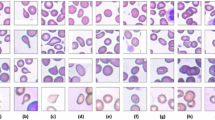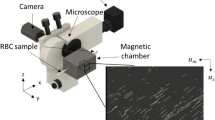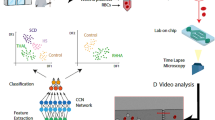Abstract
IN many cases of toxic anæmia refractile granules, generally known as Heinz bodies, are formed in the red blood cells. These inclusions may be identified by their intense basophilia when stained supravitally; after fixation with alcohol they lose this property and as a result are not usually seen in Romanowsky-stained blood films. In these anæmias there is an associated fragmentation and distortion of the red blood cells.
This is a preview of subscription content, access via your institution
Access options
Subscribe to this journal
Receive 51 print issues and online access
$199.00 per year
only $3.90 per issue
Buy this article
- Purchase on SpringerLink
- Instant access to full article PDF
Prices may be subject to local taxes which are calculated during checkout
Similar content being viewed by others
References
Leupold, E., Beitr. path. Anat., 59, 501 (1914).
Marino, S., Pathologica (Genoa), 7, 413 (1915).
Moeschlin, S., Folia Haematol., 65, 345 (1941).
Yoshida, H., Helvet. Med. Acta, 22, 62 (1955).
von Boros, J., von Boros, B., and Fabian, E., Medizinsche (Stuttgart), 2, 1208 (1954).
Virchow, R., Virch. Arch., 1, 379 (1847).
Author information
Authors and Affiliations
Rights and permissions
About this article
Cite this article
SMITH, R., BODDINGTON, M. & SPRIGGS, A. Heinz Bodies in Extravasated Erythrocytes. Nature 182, 455 (1958). https://doi.org/10.1038/182455a0
Issue date:
DOI: https://doi.org/10.1038/182455a0
This article is cited by
-
H�molytische An�mie durch Inhalation von Hydroxylaminen Zugleich ein Beitrag zur Frage der Heinz-K�rper-Bildung
Klinische Wochenschrift (1964)



